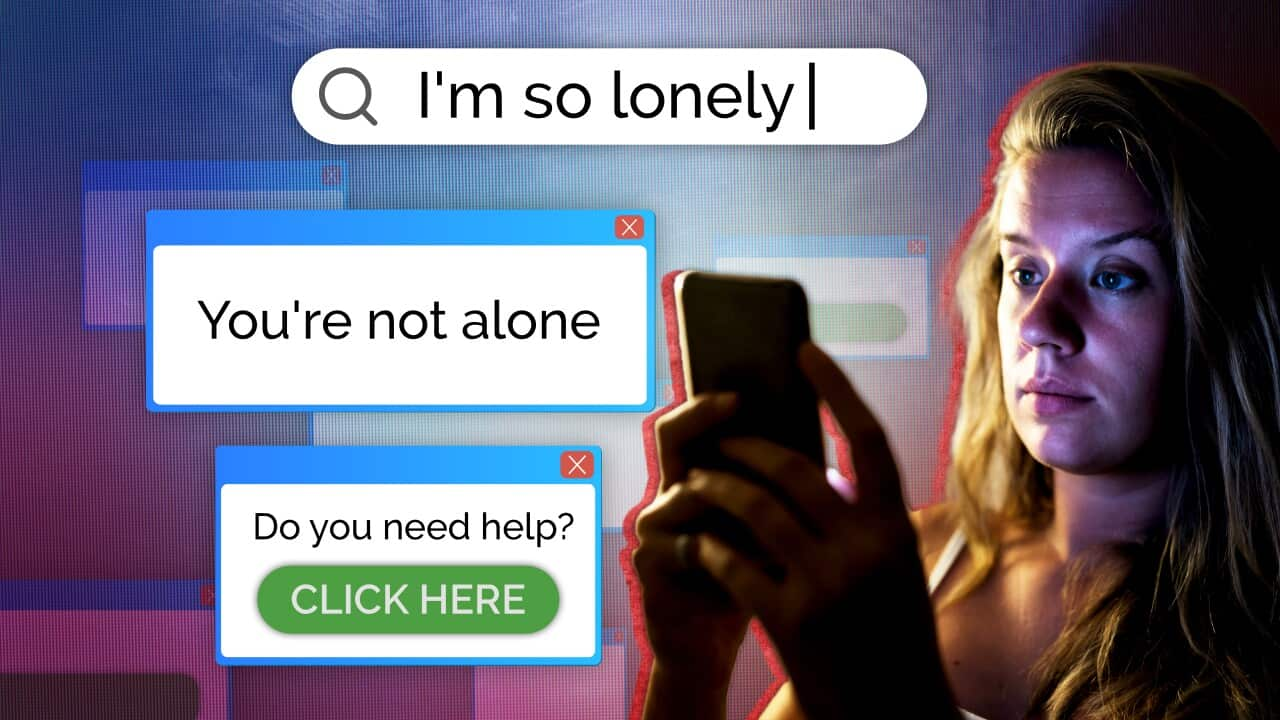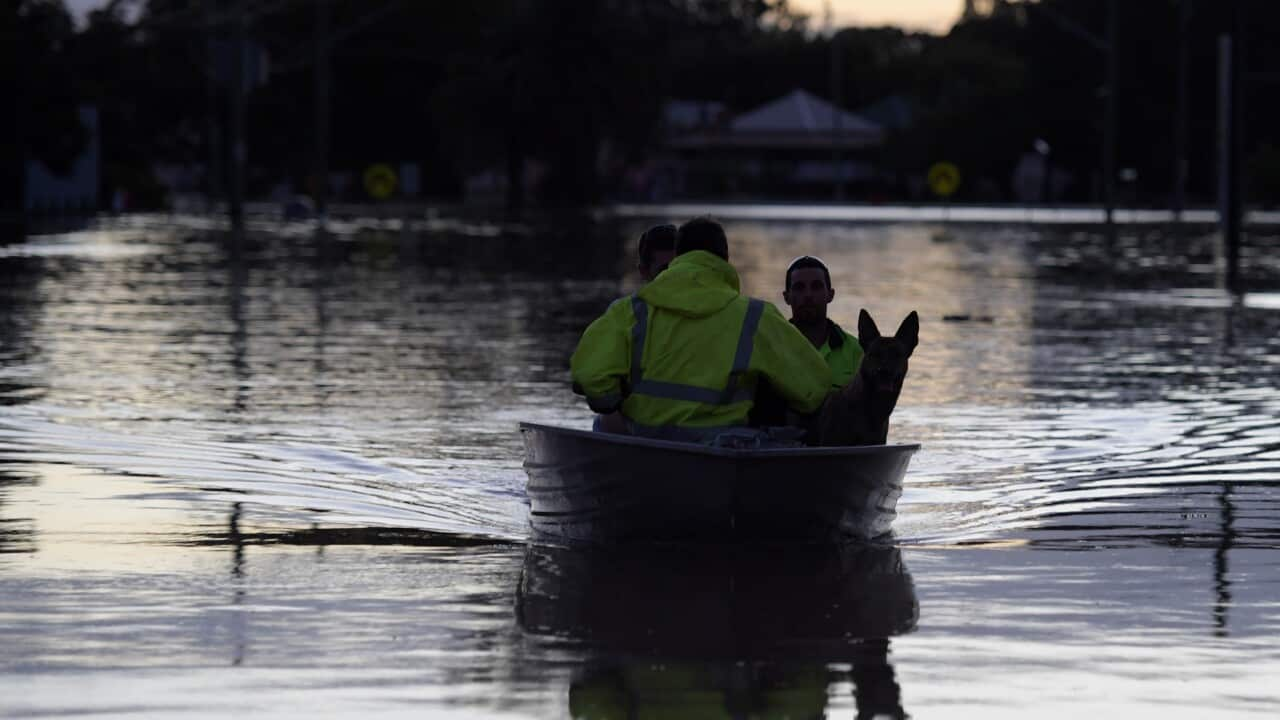Key Points
- Thousands of people die by suicide every year in Australia, a fact Sandersan Onie is determined to tackle.
- A psychologist who experienced mental ill-health believes pop-up ads could help people.
Content warning: Article contains further references to suicide.
Thousands of people die by suicide every year in Australia, a fact Sandersan Onie is determined to tackle.
The 29-year-old psychologist and researcher at the Black Dog Institute has lived experience of mental ill-health. He was diagnosed with depression in 2015, and went through multiple suicidal episodes.
Growing up in Indonesia, he also saw family members suffer and says mental health remains a taboo topic in the country.
In Australia, despite campaigns such as R U OK? Day, Dr Onie says people can still be reluctant to ask for help when they're struggling. It inspired him to research a common feature of the internet, but one that would be a new addition to the suicide prevention toolkit; pop-up advertising.

Dr Sandersan Onie. Source: Supplied
When someone typed in a distress or suicide-related keyword or phrase, an ad popped up offering help. By clicking on it, the user was immediately taken to a landing page full of resources aimed at offering an instant helping hand.
The latest shows there were 3,139 deaths by suicide in 2020. It's also the leading cause of death in people aged 15-44 in Australia, and the Black Dog Institute says figures show that for every suicide death there are 25-30 times the number of attempts.
Dr Onie delivered a talk at TEDxSydney in August in which he said the tech industry uses "complex algorithms" so they can "tailor ads and sell us things" - but that he also believes they can be used for good.
"What if we could use the same algorithms that these tech companies use to tailor ads to us to be able to identify and reach out to individuals thinking of suicide?" he said.
What if we could use the same algorithms to reach out to individuals thinking of suicide?Sandersan Onie, psychologist and researcher
Those who visited the landing page could view calming videos, distract themselves with puzzles, or read mental health research. It also featured hotlines people could call for help.
Dr Onie said the Black Dog Institute's trial, which ran for 19 days in March and is currently being peer-reviewed, reached more than 120,000 people in Australia.
"That suggests this sort of intervention has widespread reach but that also means people are distressed and are searching suicide-related keywords," he told SBS News.
A trial has also taken place in Indonesia - and is still ongoing - where Dr Onie estimates the incidence of suicide is under-reported by 300 per cent due to the stigma associated with it.
Dr Jo Robinson works in suicide prevention, collaborating with Australian and overseas universities. She said strategies like online ads are very promising.
"We've developed some social media content to help young people have those conversations online safely and ... we've partnered with the social media industry to get that kind of content onto young people's news feeds."
"Young people find it very acceptable to be served up this sort of content on their news feeds, they're very used to how the algorithms work on social media platforms, including Google."
Dr Ruth Vine, Australia's deputy chief medical officer for mental health, said technology is vital in connecting with young people in need.
"We can use technology ... so that people are able to reach out for help wherever they are on whatever technology they choose to use."

Dr Ruth Vine, Australia's deputy chief medical officer for mental health, said technology is vital in connecting with young people in need. Source: Supplied
"Stigma and discrimination are still alive and well, I'm afraid to say, in some areas of mental illness and ... particularly people with severe mental illness and substance misuse, I think it's much harder for some groups to speak up and to seek help and to seek help early."
Sydney woman Annie Ramsay has lived experience of mental ill-health. She has sought help many times over the years and believes pop-up ads could be helpful.
"You really need support or someone to make you reconsider things in that moment and feel less alone so I think the immediacy of this idea is really wonderful," she said.
"I've searched all kinds of things [online] ... I've also located mental health professional support online; that's how I found the psychologist I see."

Annie Ramsay. Source: Supplied
"It might be cliche, but you are never alone," she said. "I never thought that I would deal with the kinds of feelings that I have been through, but I have and I've come out the other side."
Dr Onie and his team hope the suicide prevention ads will be funded federally. He wants everyone to be able to benefit from them, including First Nations people and Australians from non-English speaking backgrounds.
Samantha Yorke, Google Australia's senior manager of government affairs and public policy, said the tech giant provides monthly ad grants to local organisations, including the Black Dog Institute.
"We’ve worked with partners to ensure authoritative information for suicide-related queries feature at the top of results – and that people in need can easily access national hotlines, chat services and clinically validated tools," Ms Yorke said.
Minister for Health Mark Butler did not respond to a request for comment.
World Mental Health Day is on 10 October. R U OK Day and World Suicide Prevention Day were marked in September.
Readers seeking crisis support can contact Lifeline on 13 11 14, the Suicide Call Back Service on 1300 659 467 and Kids Helpline on 1800 55 1800 (for young people aged up to 25). More information and support with mental health is available at and on 1300 22 4636.
LGBTIQ+ Australians seeking support with mental health can contact QLife on 1800 184 527 or visit . also has a list of support services.
supports people from culturally and linguistically diverse backgrounds.












